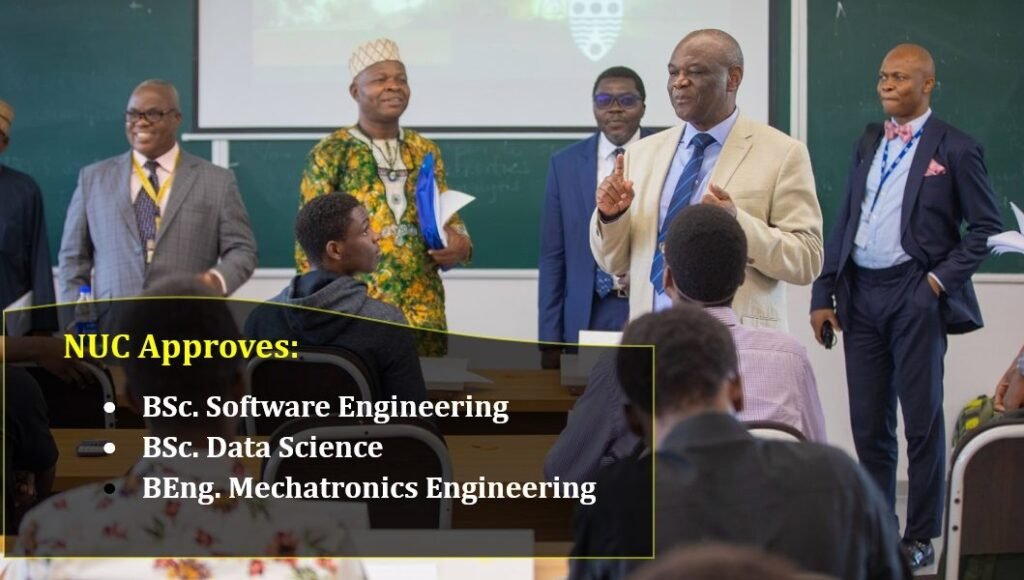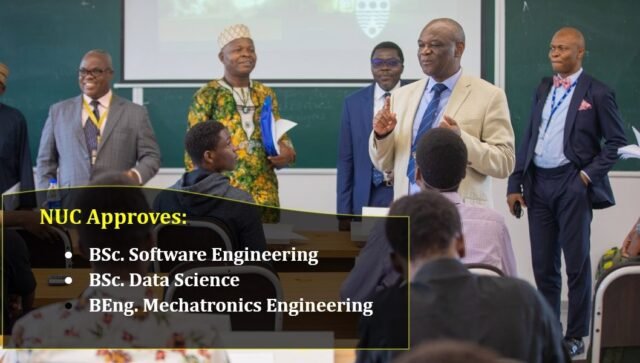In a landmark decision announced on July 17, 2025, the National Universities Commission (NUC) has officially approved Ekiti State University’s (EKSU) proposal to introduce seven fresh undergraduate programmes—most notably a B.Eng in Mechatronics Engineering. This endorsement positions EKSU among Nigeria’s leading institutions focused on cutting-edge education and national development.
Table of Contents

A Thorough Evaluation by NUC: Ensuring Quality and Excellence
In May 2025, NUC’s Resource Verification Team conducted an intensive visit to EKSU’s Ado‑Ekiti campus. Their task: to rigorously assess the university’s human capacity, faculty expertise, laboratory infrastructure, and material resources. The goal? To confirm EKSU meets national regulatory standards required to back these programmes. The visiting panel’s positive report evidently convinced NUC of the university’s readiness.
Programme Line‑up: Introducing Mechatronics and the Agritech Suite
Following the verification, NUC issued a formal letter on July 17, 2025, signed by Abubakar M. Girei (Acting Director of Academic Planning), approving these fully funded programmes:
- B.Eng Mechatronics Engineering
- B.Sc Agricultural Economics
- B.Sc Agricultural Extension & Rural Development
- B.Sc Animal Science
- B.Sc Crop Science
- B.Sc Horticulture & Landscape Management
- B.Sc Soil Science
EKSU’s decision to offer Mechatronics — an interdisciplinary field integrating mechanics, electronics, computing, and systems design — highlights proactive alignment with global technological innovation trends.
High Spirits as University Community Cheers the Expansion
The announcement sparked enthusiasm across the EKSU campus. Management, faculty, and students greeted the news with collective celebration, seeing it as a strategic pivot toward diversified academic excellence.
Executive Praise: Leadership Welcomes the Approval
Professor Joseph Babatola Ayodele, Vice-Chancellor of EKSU, spoke passionately about the milestone, calling it “a dream come true.” He expressed pride that the new curricula embody EKSU’s strategic efforts to deliver future‑proof education in fields vital to modern economic and technological development.
Ayodele extended heartfelt gratitude to key stakeholders for their support:
- Governor Biodun Abayomi Oyebanji, Visitor to EKSU, for championing educational growth in Ekiti State;
- Dr. Tunji Olowolafe, Chancellor;
- Professor Akin Oyebode, Pro-Chancellor and Governing Council Chairman.
Their advocacy was instrumental in securing the university’s expansion plans.
Student Voices: Championing Education & Innovation
EKSU students expressed optimism and pride.
Tobiloba Ogunlade, a third-year Engineering student, hailed the Mechatronics launch as “a game changer. It shows that EKSU is ready to compete globally in tech‑driven disciplines.” Simultaneously, Mary Fagbemiro, majoring in Agricultural Sciences, reflected on the programme licenses relevant to Nigeria’s growth: “Agriculture remains the backbone of our economy, and these courses will prepare graduates to tackle real‑world problems”.
Admissions: A Gateway Opens for 2025/2026
Prospective applicants are now invited to apply for the newly approved programmes under the 2025/2026 academic session. EKSU has assured that all necessary facilities — suitably prepared laboratories, cutting-edge classrooms, and qualified faculty — are available to guarantee high‑quality instruction.
Strategic Vision: EKSU on a Path to Educational Excellence
EKSU’s announcement aligns seamlessly with its broader strategy to cement its reputation as a centre of innovation and pioneering education, especially in technology and agriculture. Introducing Mechatronics broadens its engineering offerings, while the agricultural courses dovetail with national imperatives like food security, mechanised farming, and rural transformation.
Why Mechatronics and Agritech Matter
- Mechatronics Engineering merges mechanical systems, electronics, robotics, and computer control. Graduates can innovate in sectors ranging from automation and automotive to aerospace and consumer technologies.
- Agricultural Sciences (Economics, Crop Science, Animal Science, etc.) equip students with leadership and technical skills to modernise farming, manage resources, and contribute to food security — key issues in Nigeria and globally.
Broader Implications for the Nigerian Education Landscape
This development marks another positive step in Nigerian universities’ broader push to update curricula and align with economic needs. The approval reflects long-term efforts to diversify academic programmes, foster STEM growth, and empower graduates with real-world skills.
Analysts note that decisions like this can help reverse “brain drain,” retain local talent, generate job opportunities, and reinforce regional development.

Official Confirmation: EKSU’s Communication Office Responds
Mr. Bode Olofinmuagun, Deputy Registrar and Head of Information & Corporate Affairs, confirmed the NUC’s decision in an official statement. He emphasised that the new programmes are part of EKSU’s “strategic plan to meet emerging educational and professional demands.”
What’s Next: Timelines, Infrastructure, and Impact
- Admissions Launch: EKSU has opened applications for 2025/2026, welcoming students into the new courses immediately.
- Facilities Readiness: The university confirms all needed equipment — from advanced labs to lecture theatres — are ready for deployment.
- Industry Collaboration: Potential collaborations with industrial and agricultural partners are expected to offer students hands-on training and internship opportunities.
- Curriculum Updates: Programs will likely evolve to include internships, practical labs, project-based learning, and modern teaching methods.
Stakeholder Endorsements: From State to Society
Experts and educational advocates have lauded EKSU’s expansion:
- Ekiti State Government: Education has long been one of the government’s top developmental priorities.
- Educational NGOs: View new programmes as essential to building youth capacity and fueling national advancement.
- Industry Partners: Apprenticeship and internship opportunities may bolster partnerships in mechatronics and agriculture.
Given Nigeria’s widening skills gap and growing digital economy, graduates from these fields are well-positioned for job creation and economic impact.
Looking Ahead: Measuring Success
Potential success indicators in the coming years:
- Enrollment figures in the seven programmes.
- Graduate employment rates in sectors like automation, agriculture, and engineering.
- Research output — patents, startup ventures, and practical innovations.
- Industry collaborations and funded projects.
- Alumni contributions to state and national development.

Conclusion
With the NUC’s approval of Mechatronics and six additional undergraduate programmes, Ekiti State University is stepping forward as a trailblazer in Nigerian higher education. The move reflects ambition, preparedness, and responsiveness to modern needs — qualities that position EKSU well in a competitive academic landscape.
For prospective students, researchers, and industry stakeholders, EKSU’s expanded course offerings signal high potential for education, employment, and innovation growth in Ekiti State and beyond.
Join Our Social Media Channels:
WhatsApp: NaijaEyes
Facebook: NaijaEyes
Twitter: NaijaEyes
Instagram: NaijaEyes
TikTok: NaijaEyes
READ THE LATEST EDUCATION NEWS





